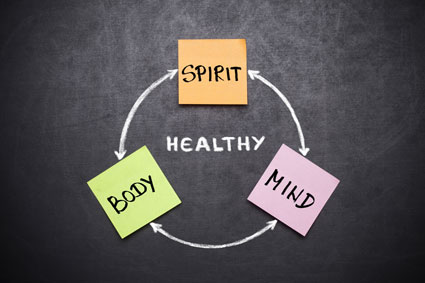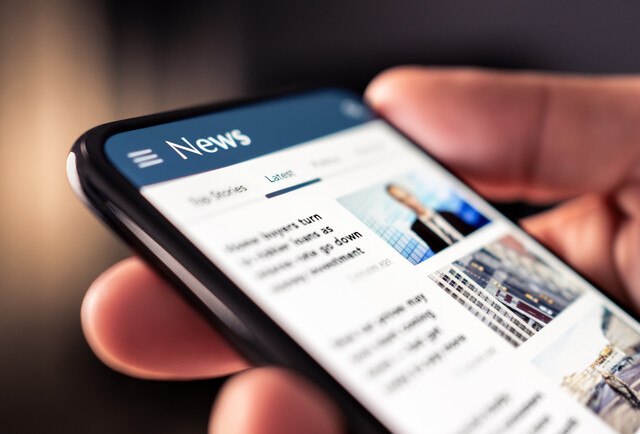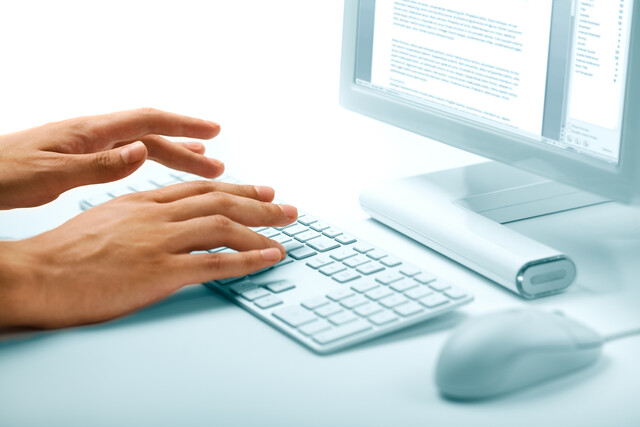While looks may not matter, presentation does. You cannot go to an interview in ripped-up jeans and expect to get the job, even if your potential boss insists he or she doesn't care. It's just not professional; but perhaps more important, it's easy to start letting things slide if you approach your job and career casually.
As much as no one wants to admit it, first impressions matter a lot. You see, it doesn't matter who you know, what you know, what your education/background is, or how good you are if everyone's first impression of you is "ew!" (as in, "What poor preparation/grooming/hygiene/grammar!"), instead of "ah!" (as in, "Ah, a good candidate!"). It is important to consider every part of your work persona.
What is a Persona?
Let's define persona first. Merriam Webster defines it as, "the way you behave, talk, etc., with other people that causes them to see you as a particular kind of person; the image or personality that a person presents to other people." Essentially, it's the "mask" or "face" we wear in particular situations.
When you put it that way, it sounds rather duplicitous, doesn't it? However, everyone does it. For example, if an individual works in customer service, how would you expect this person to behave? You'd probably anticipate at least some level of courtesy and decent grooming. The higher the individual's position in the hierarchy, the more you'd expect.
We all go out into the world during our daily lives. The moment you step foot outside the house, you're putting on a persona. Think about it for a moment � if in a bad mood, do you behave in an identical manner when with your friends at home versus walking down a city street? Chances are high the answer is, "No." It's not likely you'd leave the house upset and then cry on the shoulder of everyone you meet that day, either. We develop useful behavior adaptations to protect ourselves emotionally and save face in the outside world.
"Mental Assumptions" and Cognitive Dissonance
We all make assumptions based on first impressions. These types of "assumptions" are not stereotypes or meant to be insulting � they are a result of the natural, unconscious tendency of our brains to avoid cognitive dissonance at all costs. Cognitive dissonance is, "psychological conflict resulting from incongruous beliefs and attitudes held simultaneously." Basically, our brains really don't like it when things don't "match," so our brains build "short cuts" in order to assimilate information more quickly without having to "re-understand" what we're seeing or experiencing.
Have you ever gone to a party where some of the food had been dyed a color other than its normal hue to alter its appearance for the festivity? The most popular examples of "altering" food for festivities are green beer and macabre-looking Halloween feasts. It is a safe bet at least one � if not several � party-goers refuse to even taste a formerly favorite dish served in an unappealing color or arrangement. It makes the food "not look right." The discomfort you feel regarding the "off-color" food is a result of cognitive dissonance.
Essentially, once we've learned by observation and/or experience what to expect from a specific object or situation, we become uncomfortable and distrustful if the situation doesn't match our expectations. You may love both lemon cake and chocolate cake, but if you bite into a chocolate-looking cake expecting to taste chocolate and instead taste lemon, you'll probably spit it out. Not because you dislike lemon cake, but because right at that moment lemon was nowhere in your mind � you were expecting chocolate.
So it is with a potential employer. If your resume is outstanding and you're called in for an interview, imagine their unhappy surprise if you show up in grubby jeans and a dirty shirt. You need to ensure you "match" all the way through.
When applied to an individual seeking a professional position, such as personal assistant, it means the interviewer(s) will have an expectation of a certain level of dress, hygiene, self-expression, and interpersonal skills. It is your job to ensure you make a good impression, which means dressing and behaving in a manner designed to impress more people than just your potential boss. You need to look the part of a professional personal assistant.
Some employers have multiple people interview a personal assistant candidate. Even though the interviewee will be working directly for and with one individual, if they are required to be part of a team, it's likely the other members of the team will want to interview them, as well. If applying for a PA position with a virtual assistant group, you may be interviewed by multiple managers.
Elements of a Good First Impression
Hygiene means more than just bathing, although it's a very vital part and the basis of good grooming - to really be well-groomed, you need to start with a "clean slate."
Heavy, dramatic makeup and hair styles are fun and very "in" now, but some looks may not be appropriate for the position you're applying for. If a potential employer has a more conservative public persona, it may not be to his best advantage to hire someone with a spikey purple Mohawk. It may not be an issue whatsoever, but it is better to for an applicant to err on the side of caution.
At minimum, your hair should be clean and brushed or combed. Again, if you have an extremely over-the-top hair style, you may want to tone it down a bit for the interview, but it's not a good idea to make drastic changes toward "normality" prior to being hired; after all, you may not get the job. Do not use too much hair product in an attempt to tame wild hair, however; you'll just wind up looking greasy, which is worse than having wild hair.
Clothing must be clean and neat, with no stains or tears. Iron the garment if it is wrinkled. Gentlemen, in particular, need to watch for excessive creasing behind pant legs and at the inner elbows of their suits. You don't want to look "rumpled" � it makes one look unprepared and sloppy. Sleeve cuffs, underarm areas, and necklines should be free from stains or discolorations. There should be no old "body odor" lingering in dry-clean-only garments; if you can't afford to take that amazing suit to the cleaner prior to the interview, choose something else to wear. It may look great, but if it smells stale or musty, it will make the opposite impression you're going for.
Another consideration is scent. Some individuals have difficulty breathing when around strong or overwhelming artificial scents. Remember your Great-aunt Edabelle, who you could have sworn dumped an entire bottle of cologne over her head every morning? Sadly, sweet old Edabelle's scent overload would probably cause a person with such allergies to stop breathing. For some, even a little scent can be dangerous. Your best course of action is to go scent-free: until you are hired and know if wearing scent is acceptable. You'll want to consider not only your boss, but his associates' needs when deciding whether or not to wear colognes.
Some of us who love our "bling" have a tendency to wear a bit too much for an interview. It's a good idea to keep jewelry to a minimum until you've secured the position. Even then, you may find the amount or type of jewelry you usually wear isn't practical to wear at work. This is actually fine � remember, you are building a professional persona, which may be "toned down" or "amped up" compared to what you consider your "basic" personality.
Interview Tips
When going for your interview(s), don't bring a lot of "stuff" with you. Keep personal possessions to a minimum. A regular-sized handbag or case for your necessary belongings is fine, but you'll want to leave the weekend-sized bag of stuff you normally haul around at home or in your vehicle. Nobody wants to see that, especially not a potential employer. And do not overstuff the bag you're carrying with you to the interview! It is better to remove items and leave them at home or in your vehicle than to have everything spill out as you're walking up to shake hands or attempting to remove something from the bag.
Being punctual is essential. Make plans to arrive early, preferably about 15 minutes prior to the interview time. We do not mean "driving up and screeching to a stop" 15 minutes prior, we mean "ready to shake hands" prior. You don't want to rush in, out of breath; you'll want to give yourself a few moments to breathe and mentally prepare for the interview. You also want to allow some extra time in case of unexpected delay. To avoid last-minute issues, double-check your transportation plans the night before the interview.
If you plan on driving, make sure you have plenty of fuel (you'll want a little extra in case you get lost in an unfamiliar area). Bring any coins or money you may need for parking meters or garages. Many parking meters take coins only, while those in larger cities often require payment by card. Make sure you know the route you're going to take and print out any maps or directions you may need. Gather these and any other documents you need to bring with you and place them where you're sure to remember them, preferably near or with something you will take for certain. Placing them near your car keys works � just remember to pick the papers up along with the keys.
If you're taking public transportation, you may wish to double-check the schedule and ensure you have the proper money or tokens to make a smooth transaction. Avoid the hassle of attempting to change money at the last minute and/or in an unfamiliar situation.
Remember to set your alarm. Countless individuals have lost job opportunities by either forgetting to set the alarm or setting it incorrectly and oversleeping. Don't allow yourself to become overly anxious about this - typically that's when things go awry. Just double-check right before you turn in for the night, and make sure you go to bed at a decent hour to ensure you get enough sleep and awake refreshed.
Speaking of breath, you'll want to avoid the garlic pizza lunch right before your interview. You might physically get no closer to your interviewer than hand-shaking distance, but the odors from some strong foods, such as garlic, can travel a long way. It is also a good idea to have a small bottle of water with you. It is common for one's mouth to get dry when nervous. Breath mints are a good idea prior to your interview, but avoid having any in your mouth when you are introduced. Do not chew gum.
When the interviewer asks if you "found the place okay" or something similar, don't regale them with tales about any troubles getting there. If you're hired, it's possible you'll eventually get to that level of candor, but during the interview is not the time to bring up how you just barely made it to the interview on time, or about the jerk who cut you off, then starting flipping you the bird for no reason. Even if such anecdotes are meant to be humorous, it typically ends up sounding like whining or complaining, neither of which will help you land the job.
Speaking and Diction
One reason to avoid having anything in the mouth when meeting and speaking with the interviewer relates to how it affects speech (it is also rude). You want the interviewer to be able to understand you easily to avoid confusion or misunderstandings. It also gets tiring, for both parties, to continually ask to have statements or questions repeated.
It can also give the impression the two of you won't communicate well together, which may actually be true, in which case it's best to know this at the interview stage, so both of you can move on to more favorable situations. At the same time, you do not want to throw away a good opportunity because you mumbled your way through the interview. Make good eye contact, but don't "stare her down" or behave in a flirtatious manner. Sit up straight and look as though you're engaged in the interview fully, even if the employer is rambling on about something you don't quite understand. At the same time, don't overdo it � you're trying to get a job as a PA, not land a role in the latest TV drama.
Mannerisms, particularly "nervous tics," can be distracting. Because they are mostly subconscious, at least when the action begins, most of us have to make a conscious effort to control them. Things like biting your nails, tapping your fingers, bouncing your legs, and the like, are very distracting and can come across as excessive nervousness (which may be the case), inability to focus, or lack of attention to the situation at hand, especially if you tend to look around the room a lot or glance at your watch frequently. In fact, during an interview, you need to pretend your watch and cell phone do not exist. Remember to turn the volume down or turn the phone off completely prior to going in to the interview. You do not want it making noise � it is distracting and can actually cost you a job opportunity.
"Vocal tics" are another thing to avoid. If/when you're hired, you'll need to get rid of those anyway, since they make one sound unsure or confused. Again, it will initially be a conscious effort to avoid uttering them, but eventually, you'll find you've dropped the habit.
Sincerity is very important. The people you wish to work for are typically good at spotting phonies, and they tend not to hire such individuals. Remember, a PA is trusted with a high amount of personal information and has an intimate working relationship with his or her boss. If you're perceived as insincere, you'll likely be branded as untrustworthy, as well.
Your Professional Persona, Part 2
We still have a few more points to cover regarding professional persona beyond "walking the walk and talking the talk." This article will address those points. We'll begin with something no one wants to think about � failure.
Mistakes vs Failures
Most people commonly use the words "mistake" and "failure" interchangeably, but they have different meanings. Often, we label our mistakes as failures, when all we've really done is make a simple mistake. Conversely, some things we see as harmless mistakes are actually disastrous failures in disguise.
No one honestly sets out on any endeavor, whether it's a morning fishing trip or a new career, with the goal of utter failure. While some individuals perpetually engage in self-sabotage, their initial desire is to succeed. They fail primarily out of fear of success. (A discussion regarding fear and self-sabotage is essentially a course in itself, so we won't go into it here.)
A mistake is defined as, "to make a wrong judgment about (something)." Most of us make wrong judgments every day. Minor errors, such as turning down the wrong street while driving to a friend's house, or forgetting to add the baking soda when making a batch of cookies are good examples of easily correctable mistakes.
Not all mistakes are equal in severity; in other words, some mistakes are much easier to correct than others. To continue with our previous example: If you miss your turn by a block or two, a simple drive around the block to the next street will likely resolve the problem; as long as you remember to add in the baking soda before baking the cookies, the recipe will turn out fine. However, if the area is a maze of one-way streets or the batter has already been baked into cookies, correcting the problem may take a little more effort and ingenuity.
Most of the time, innocent daily errors are of little or no concern. However, seemingly little things can have far-reaching consequences, and in the world of a professional personal assistant, this is especially true. Forgetting to make arrangements for an important meeting your employer is planning is a little mistake (failure to make a phone call) which has far reaching consequences (loss of reputation, clientele, or opportunity, for example).
You'll notice the word failure appears in the previous paragraph in relation to mistakes. Merriam-Webster's definition of failure is, "omission of occurrence or performance; specifically a failing to perform a duty or expected action." By this definition, if the cookies had already been baked when the missing ingredient was remembered, that particular batch would have been a failure due to the omission of the baking soda.
The mistake of forgetting to make an important phone call for your employer, however, will likely lead to more severe consequences than just a few moment's delay or some flat cookies in the trash. For those who employ PAs, lack of arrangements can spell disaster in the form of lost reputation or financial benefit. Just as forgetting where to turn when you're late to take your friend to an important job interview may affect his opportunity to embark on a new career, failing to make a phone call or two to secure needed arrangements can result in the loss of reputation or opportunity for your boss, which is likely to be substantial. (Such events won't look good on your resume, either.)
It is imperative a personal assistant understand the importance of avoiding mistakes in relation to their job. Always remember, a small slip of memory or "lip" can have massive repercussions. And if mistakes are frequent or cause great repercussions, it's likely to be the end of that job, and possibly your PA career.
Coping With Failure
As mentioned previously, failures can be small or large, ranging in scope and intensity. Failure can � and does � happen to people of all ages, from all walks of life. In fact, part of the role of a personal assistant is to help protect the boss from the prying eyes and paparazzi who wish to expose and capitalize on even the most honest mistake. For a celebrity or public figure, "clean-up" after an unfavorable public event usually involves more than one helper. High-profile individuals have a public persona to maintain and much more to lose than the average person when something in their life goes awry. As the old saying goes, "The bigger they are, the harder they fall."
To be an effective and valued personal assistant, you must learn to manage all the failures and challenges you face in your own daily life. No matter how understanding and kind they may be, your employer has no tolerance for continual or intense drama. It is one thing to share sad news upon occasion with a caring employer, and quite another to dump personal problems at their feet day after day. This is not what you're paid for; in fact, it could be considered the opposite of what you're there to do.
A personal assistant needs to remember high profile/wealthy individuals are often out of touch with many aspects of everyday life. In other words, don't expect sympathy or understanding if you provide explanations such as, "The car wouldn't start," or "The babysitter was late," for your own tardiness. Even the fact you were late can be incomprehensible to them, despite any propensity toward tardiness they themselves possess.
If you make an error, the best way to cope with it is do your best to fix the error immediately. Depending upon your employer, the best course of action may be not to tell him or her, and instead find a way to rectify the problem yourself. Remember, your main job is to keep your boss from having to worry about anything else aside from doing his or her own job.
At any rate, it is crucial to rectify immediately any mistake you may make. A smart PA will create his or her own secret "disaster book," complete with companies, names, and numbers of those who can get you out of a tight spot should things go wrong, be it your doing or someone else's. There are some mistakes you may be unable to correct, in which case, you will likely be demoted or lose your job entirely. If the mistake is an utter failure, you may lose your PA reputation altogether. The PA industry is fast and competitive, and if you work for a high-profile or celebrity client, there are at least three or four qualified applicants in the wings waiting to swoop in and take your position. There is not a lot of room for a "learning curve" in a new PA job when your client is famous � you are expected to hit the ground running, even more so than with a "regular' PA client. Messing up "the little details" is not really an option for a personal assistant, since to the typical PA boss, the important details are the small ones.
Fortunately, failure is not permanent state of affairs, no matter how it may feel when the disappointment and embarrassment of failure are still fresh. Everyone messes things up once in a while; the key is to do everything in your organizational power to avoid mistakes, own up to or correct them, learn from them, and move on.
Managing Social/Electronic Media
As you may have ascertained by now, managing your own life is critical to your success. If you have unfinished business at home when you begin your workday, you need to "leave it at the door" when you arrive at work and focus solely on the job at hand. Work at minimizing the chance of potentially disastrous errors by being organized in all aspects of work and career. Which brings up our next topic � social/electronic media. We'll use the term electronic media to refer to the gadgets themselves, and social media to refer to programs, games, etc.
Modern technology, one of the integral components of everyday modern life, is a double-edged sword. While it can help with efficiency and keeping in touch with others at all times, it can also be a hindrance, an annoyance, and even a detriment, at times.
First, having a cell phone means you can keep tabs (somewhat) on what's happening at home while at work. It also means you'll be tempted to check in frequently, which is distracting and takes your focus off your job. Not to mention, you don't want your employer or their associate to round the corner and see you messing with your phone when you're supposedly off on another task.
If you have children, make and enforce the rule you are not to be contacted at work unless there is a dire emergency involving large amounts of blood or possible loss of life. This may sound horrifying or amusing, but it gets the point across. A personal assistant does not have time to take phone calls from children asking for a referee in a fight over who gets to choose the afternoon program on TV. (Any sitters or nannies you employ need to know and enforce this hard and fast rule, as well.) Repeated occurrences such as this lose jobs for PAs.
Another trap is social media. Nearly everyone has some type of social media account now, including your boss. In fact, you may be asked to manage and/or post to their social media page(s) in their stead, so you'll have access to not only the Internet but to social media during your work day. Getting caught posting on social media sites instead of performing your duties is almost guaranteed to get you fired.
Your caution when dealing with social media needs to extend beyond your time of employment � in fact, it should begin long before and continue throughout your career. Since Internet access and social media are so prevalent, you must assume any potential employer may do not only a background check, but a social media check as well.
This typically involves the employer, one of their associates, or a hired firm looking up your name on the Internet, sometimes using sophisticated tools which go beyond basic, easy-to-locate information. After all, if you're going to work in a high-pressure, high-profile environment, you need to maintain an appropriate, somewhat professional online presence, even with your "personal" accounts. Once you step into world of public figure clients, you, too, will be scrutinized to some degree. Even if you're not, certain things posted on social media, which seem innocent to the one posting, can be seen as inappropriate or "too much information" for a potential employer's taste.
Anything "juicy" in your past, like those videos you posted from your Spring Break trip to Cancun where you were overly drunk and doing a strip-tease on top of the bar in front of 200 strangers might have seemed harmless when it happened, but the repercussions of such behavior in the digital age reach far and wide. The media might not care about your college escapade, but a potential employer may see it as evidence of irresponsibility or lack of good judgment. Chances are, they won't share this information with you, either, and you'll be left to wonder what went wrong.
Social media is a fun, interactive, common part of everyday life in the 21stcentury; it is also easily accessible and personal information is easy to come by from multiple sources for those who know how to look. Do not post information or photos that may be detrimental to your professional reputation, and be wary of getting carried away to the extreme in public situations. Also take care in opinions you express, and avoid using curse words and harsh or derisive language. Avoid inappropriate or negative comments relating to race, sexual orientation, ethnicity, gender, or other socially sensitive subjects. Religion and politics should also be avoided as topics of intense discussion.
This is not to say you must refrain from enjoying your social media contacts; just be aware of how your posts (and in some cases, individuals on your friends list) might appear to a potential employer. We recommend you create two social media accounts for each app you use, one personal and one professional. While you should maintain a standard of quality on both accounts, you can use your social account for your everyday life and reserve the other for professional contacts and viewing only.
























